The LDA Podcast: An Exploration of Evidence-Informed Approaches to Learning and Development
Originally spearheaded by noted learning scientists and consultants, Will Thalheimer and Matt Richter, and originally called Truth In Learning, the updated, upgraded, and rebooted LDA Podcast explores all aspects of the Learning and Development field- validated tools and resources for better training, debunked learning models, controversies in the industry, and so much more. Now hosted by Matt and Clark Quinn (another noted scientist and consultant, the podcast will dive deeply into what makes learning and development more effective and beneficial for its end-users, stakeholders, and practitioners. Along with our monthly and general episodes, we will also offer a monthly series on AI, hosted by AI expert, Markus Bernhardt. Over the upcoming season, The LDA Podcast will: -- Keep you current with L&D research and innovations -- Unpack complex ideas and concepts -- Sharpen your critical thinking skills -- Stimulate your L&D grey cells (although this objective may not be evidence-based) N...
Episodes
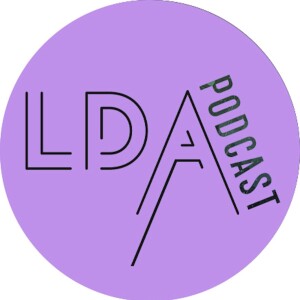
Monday May 05, 2025
Monday May 05, 2025
SHOW ME HOW YOU DO IT is the new LDA VLOG and podcast brought to you by our friend, Sofie Willox. In each episode Sofie will interview an expert. These experts come from various domains within and surrounding L&D. Sofie interviews them on video. The videos will reside within the LDA community, but we wanted to nonetheless still share them and decided to post them here in the podcast feed. We hope you enjoy!
This first interview is with another LDA friend, Charles-Louis de Maere. The following are his own words about his work.
"Bringing people together is something that lives on through my workshops and training. Whether they take place online or on-premise, I facilitate workshops and learning experiences that focus on high participation, on learning by doing and verifying that the concepts are integrated. I use Live Online Learning Activities to ensure people get a chance to practice their understanding of the new concepts.
"What better way is there to give meaning to what we say than to draw to make our thoughts explicit? When we add visual information to what we’re saying, suddenly our intention becomes much more precise, and we can begin to work on shared understanding. This is why I love bringing people in contact with the power of Visual Thinking, of getting back to our roots and using pen and paper to bring people closer together."
The best place to find Charles-Louis is LinkedIn. He is prolific there and always finding ways to add value.
https://www.linkedin.com/in/charleslouisdemaere/

Friday Feb 28, 2025
Friday Feb 28, 2025
Clark and Matt are delighted to be joined by Paige Bradbury… an expert on using LLMs— specifically for those of us novices. She is particularly expert at developing the right prompts to get useful, and more importantly, accurate responses from the LLM.
We learn about things like hallucinations… prompt drift… context windows… explainable AI... xAI… and more! We talk about the work, time, and money that go into writing good and effective prompts, let alone using AI in general. And Paige shares plenty of examples along the way. We talk about different LLM options and LLM databases.
We connect to previous LDA Podcast episodes and discuss IP and ethical usage of AI and LLMs. And we end the episode with a survey of the current and future state of AI-- at a very high level.
You can learn more about Paige’s upcoming March 19, 2025, LDA program here: https://ldaccelerator.com/sessions#calendar-3caaa5f3-7151-409b-b39d-16b86bfe5253-event-m5u16n4b
You can learn more about Paige… and connect with her here: https://www.linkedin.com/in/id-by-paige/.
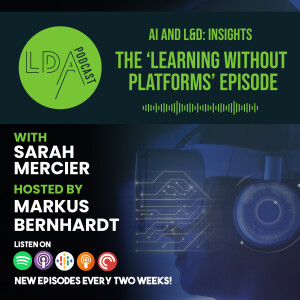
Sunday Jan 26, 2025
Sunday Jan 26, 2025
Summary
In this episode of AI and L&D Insights, Markus Bernhardt speaks with Sarah Mercier, CEO of Build Capable, about her patented innovations in learning technology. Sarah challenges outdated LMS models, introduces her groundbreaking XCL tool for decentralized content delivery and tracking, and reveals how AI can unlock powerful insights—provided the data is meaningful. With decades of expertise and a vision for the future, Sarah’s approach is a game-changer for modern learning.
You can find more about Sarah, here:
Linkedin - https://www.linkedin.com/in/sarahcmercier/Websites – Build Capable: https://buildcapable.comBuild Capable XCL: https://buildxcl.com

Sunday Jan 26, 2025
Sunday Jan 26, 2025
NOTE: This podcast was recording in November, 2024.
Today, Clark and Matt are joined once again by our dear friend, Nidhi Sachdeva.
We talk about Desirable Difficulties, originally coined by Robert Bjork and further explored with him and his wife, Elizabeth Bjork. A great overview paper can be found here: https://bjorklab.psych.ucla.edu/wp-content/uploads/sites/13/2016/04/EBjork_RBjork_2011.pdf
Of course, we talk about the five strategies to foster desirable difficulties:
Spaced Learning/ Distributed Practice
Retrieval Practice/ The Testing Effect
Interleaving
Contextual Interference
Reduced Feedback
We even take a brief detour on whether note taking is effective. And of course, the answer is nuanced... see more here, from Paul Kirschner: https://3starlearningexperiences.wordpress.com/2023/05/09/longhand-notetaking-is-worth-using/
Clark references Mihaly Robert Csikszentmihalyi's Flow... and frankly, the wiki page on it is pretty darn good. https://en.wikipedia.org/wiki/Flow_(psychology)#:~:text=Flow%20state%20theory%20suggests%20that,key%20determinant%20of%20learning%20success.
He also mentions Lev Vygotsky's Zone of Proximal Development. https://en.wikipedia.org/wiki/Zone_of_proximal_development
Matt references Thiagi's jolt called THE DAYS OF THE WEEK. Here is a video of the short activity: https://ldaccelerator.com/days-of-the-week-jolt
Clark references MAKE IT STICK, by Brown, Roediger, and McDaniel: https://www.amazon.com/Make-Stick-Science-Successful-Learning/dp/B0DG1195CM, as well as their colleague, Pooja Argawal, and her book, POWER TEACHING: https://www.amazon.com/Powerful-Teaching-Unleash-Science-Learning/dp/111952184X/ref=as_li_ss_tl?keywords=powerful+teaching&qid=1572929667&smid=ATVPDKIKX0DER&sr=8-3&linkCode=sl1&tag=retrievalprac-20&linkId=a877fbf2e13704463c6402641571742c&language=en_US
We do mention the LDA Learning Science Conference 2024... and how Nidhi will be there presenting about Desirable Difficulties... However, the conference is now past. But, Nidhi will be at the upcoming LDA The Evidence-Informed Practitioner Conference in April, 2025 and repeating her work in the 2025 Learning Science Conference.
________________________________________________
More about Nidhi…
Nidhi Sachdeva is an evidence-informed learning designer, post-secondary educator, researcher, and educational technology specialist. She is interested in designing and integrating evidence-informed instructional practices using various educational technology tools, including GenAI. Recently, she has been researching this through microlearning and cognitive science. Nidhi is the co-author of a newsletter called The Science of Learning, which aims to reduce gaps between educational research and instructional practice. She also chaired the ResearchEd Toronto conference 2024, ' Discovering the Science of Learning.' With almost 20 years of experience developing and facilitating learning content for both face-to-face and online courses within formal higher education, Nidhi is extremely passionate about integrating the Science of Learning into her pedagogical practice. She is currently teaching in the Teacher Education program at the Ontario Institute for Studies in Education (OISE).

Thursday Dec 12, 2024
Thursday Dec 12, 2024
OVERVIEW
In this episode, Markus Bernhardt is joined by Kate Macartney, CEO of MVM Strategies, to explore how AI tools like Microsoft's Copilot are reshaping the way we work. From personal productivity hacks to organization-wide transformations, Kate shares practical insights and real-world examples of how Copilot integrates seamlessly into workflows, making everyday tasks faster and smarter.
Discover how organizations can unlock the potential of AI tools while navigating challenges like adoption, privacy, and cultural shifts. Kate also takes us behind the scenes of the Microsoft Ignite conference, revealing future trends in AI automation and business process enhancements. Whether you're just starting with AI or looking to scale its use across your organization, this episode offers a wealth of actionable advice and inspiration.
HOW TO FIND KATE:
Linkedin: Kate Macartney | LinkedIn
Website: mvmstrategies.com
CO-PILOT
Copilot is free to try (not connected to apps, just for chat): https://copilot.microsoft.com/
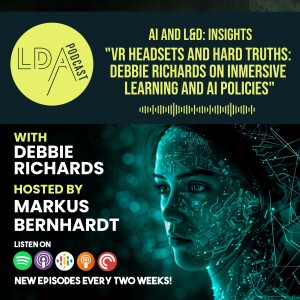
Thursday Nov 14, 2024
Thursday Nov 14, 2024
OVERVIEW
In this episode, Debbie Richards and Markus dive into the cutting edge of immersive learning and the hard truths of AI policies. From navigating VR headsets to addressing the ethical challenges of AI in the workplace, Debbie shares invaluable insights for L&D professionals. Learn why a 'common sense' approach won’t cut it when managing AI, and how immersive tech is transforming the learning landscape. Tune in for practical advice on upskilling, reskilling, and making AI work for your organization—without sacrificing ethics or data security.
Shownotes:
Debbie Richards on LinkedIn - https://www.linkedin.com/in/cre8iveii/
Creative Interactive Ideas - https://cre8iveii.com/
AR/VR article - https://www.learningguild.com/articles/immersive-frontiers-transforming-learning-with-ar--vr/
Notebook LM from google - https://notebooklm.google/
L&D Cares - https://www.ldcares.org/
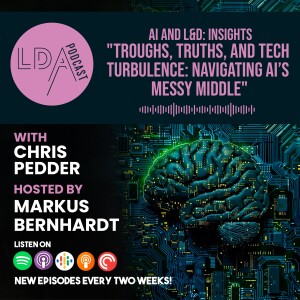
Friday Oct 18, 2024
Friday Oct 18, 2024
With Special Guest, Chris Pedder
Think AI is all about buzzwords and breakthrough moments? Think again. Markus and Chris navigate the gritty reality of AI’s ‘messy middle’—the point where big ideas meet even bigger challenges. Grab your headset and get ready for an unexpected dive into the future of tech, where innovation truly happens after the hype fades. From ethical dilemmas to economic realities, this episode will change how you see AI’s role in our world.
Links and Connections from the Episode
Chris Pedder - https://www.linkedin.com/in/chris-jb-pedder/
Obrizum - https://obrizum.com/
Ray Kurzweil - https://en.wikipedia.org/wiki/Ray_Kurzweil
Perplexity - https://www.perplexity.ai/
you.com - https://you.com/
Corey Doctorow on Enshittification - https://pluralistic.net/2023/01/21/potemkin-ai/#hey-guys
Nick Bostrum on Paperclips - https://onlinelibrary.wiley.com/doi/10.1002/9781118922590.ch23
IBM article on AI Alignment - https://research.ibm.com/blog/what-is-alignment-ai
Anil Seth on Consciousness and AI - https://osf.io/preprints/psyarxiv/tz6an

Tuesday Oct 08, 2024
Tuesday Oct 08, 2024
We take a break from our regularly featured programming. The following is the audio from a special, informal discussion about AI that LDA recently produced for our community. We thought it lent itself nicely to the podcast, as well.
In this special discussion, Lori Niles-Hofmann and Stella Lee school Matt on the basic ins and outs of AI. We talk about what AI is. We talk about the different types of AI. Matt asks whether the world of Terminator is soon coming to pass! Stella and Lori correct that notion.
We dive into the ethical issues that using AI impact both short-, and long-term. We delve into how information gets curated on different AI platforms. We explore the implications in general, as well as for L&D, when using AI. Specifically we look at the practical implications. Can we use AI to help us solve some of those wicked problems we face?
Lori and Stella share advice on how to engage with vendors pushing their AI offerings. Or, at least some questions one might ask when others are authorized to buy, but you have to use it.
Speaking of practical… and speaking of ethics… when is it ok to use AI when constructing designs, writing, or researching? What are hallucinations? When does the AI misunderstand us? How do we misunderstand what we get from it?
While many are way more educated and knowledgeable about AI than Matt. Many others are still confused about what it all means and what it does— but are frankly, slightly… mildly… embarrassed to ask.
Ok… Matt admits, he had no clue what generative AI referred to instead of “regular” AI. But he does now, as a result of Stella and Lori's educational explanations.
The bottom line is this special program provides the highlights of AI basics as it pertains to L&D. We hope you enjoy!
_____________________________________________
More about Lori and Stella:
Lori Niles-Hofmann
Lori is a senior learning strategist with over 20 years’ of L&D experience. Specializing in large-scale digital learning transformation, Lori is passionate about helping companies navigate the ambiguity of change. After leading and completing numerous EdTech implementations, Lori has developed the data-based methodologies and frameworks that empower L&D teams to move from a business support function to strategic business driver. Lori is currently based in Toronto, Canada with one foot in Europe.
STELLA LEE
With over 20 years of experience in the e-learning and edtech industry, Stella is a director at Paradox Learning, a consulting firm that provides and evaluates innovative learning solutions across multiple devices, cultures, and platforms. She work with clients from various sectors, such as government, education, non-profit, and corporate, to help them achieve their learning and development goals with data-driven and technology-enabled approaches. As a consultant, startup advisor, writer, speaker, community organizer, educator, and researcher, she is passionate about sharing her insights and expertise on e-learning, edtech, AI, learning analytics, adaptive and personalized learning, and more.

Thursday Sep 19, 2024
Thursday Sep 19, 2024
Guest: Vince Han, CEO of Mobile Coach
Summary: In this episode of AI & L&D Insights, Markus Bernhardt dives into the world of proactive AI with Vince Han, the visionary behind Mobile Coach. Together, they explore the game-changing evolution from passive chatbots to AI agents that do more than just answer questions—they engage, assist, and even anticipate your needs.
Join us as we break down how AI agents are revolutionizing learning and development, from onboarding new hires to creating seamless, proactive user experiences. Vince shares how chatbots are moving beyond surface-level interactions to becoming indispensable virtual colleagues in your workflow. Whether you’re interested in L&D, AI innovation, or the future of work, this episode offers practical insights into how AI agents are reshaping the workplace—faster than you think.
REFERENCES
Vince's Linkedin: https://www.linkedin.com/in/vincehan/
Mobile Coach Website: www.mobilecoach.com
Eliza https://en.wikipedia.org/wiki/ELIZA
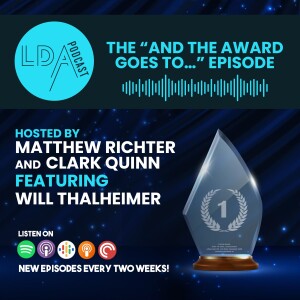
Thursday Sep 05, 2024
Thursday Sep 05, 2024
We are rejoined by Will Thalheimer to talk about one of his favorite topics, awards in the L&D industry. Should we have them? Should we give them out? How do we do it better… if at all?
We explore a pretty exhaustive list of the general issues with using and distributing awards among industry professionals by industry professional groups. Heck, we even find a few good points to support the tradition, as well.
Are these industry awards fair?
Are they judged effectively and fairly?
What are, and should, be the criteria for winning an award? What rubric is used? Who designs the rubric? Are we even rewarding the “right” stuff (whatever that means)?
What about money? Application fees? And paying for the awards? Bias? Vendor relationships?
Heck, are these awards even manageable… doable in order to ensure claimed standards and fairness?
Is an evolving approach, perhaps to think about certification?
Who judges the judges?
Will even hands out an award called the Neon Elephant Award, as he attempts to bypass many of the issues we discuss. You can learn more about it here: https://www.worklearning.com/2010/11/02/neon-elephant-award/. Does he succeed?
Yes— we know there are tons of awards out there, so we are speaking generically. But the questions of fairness and appropriate judgement still hold.
Matt references NASAGA. The North American Simulation and Gaming Association. We also reference ISPI, the International Society for Performance Improvement.
Any conversation about awards within the context of L&D would, and should, lead to a conversation about program and practitioner evaluation. We, of couse, talk about Will’s Learning Transfer Evaluation Model (LTEM). You can learn more about that here: https://www.worklearning.com/ltem/.
Will brings up one of his passion ideas… that within L&D, we should have independent journalists investigating and report on how we do, what we do, and what we could do better. He originally talks it about it in the LDA Podcast, Episode 4.
And what about impact? Is impact the key? Or, are we missing the boat? What about the differences between learning and impact? How do we ensure that our learning engagement was actually the cause of the identified impact.
LDA had the wonderful, Alex Edmans, from the London Business School, on our MEET THE AUTHOR Series. The video is here: https://members.ldaccelerator.com/c/meet-the-author-space/meet-the-author-alex-edmans. We reference his new book, May Contain Lies. You can find the book and learn more about Alex, here: https://alexedmans.com/books/
Will’s new book is The CEO’s Guide to Training, eLearning, and Work. You can learn more and buy it here: https://www.ceosguide.net.
You can learn more about Will here: https://www.worklearning.com/about/.








